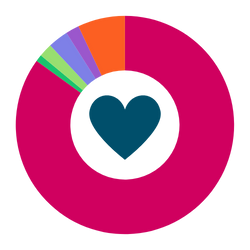Healthwatch 100: The Vaping Habits of Children and Young People in Trafford

In gathering the views of children/young people and parents/carers, we have explored the prevalence of vaping in Trafford, how the issue is being addressed on both an individual and a contextual level, and we have gained a baseline insight into use of snus1 in the borough.
Our surveys garnered almost 6000 responses from children and young people as well as parents and carers. Through these, we found that over one fifth of children and young people have either tried vaping or do so on a regular basis. For those who do vape, a large proportion are either planning to cut down or quit or are already trying to do so. Parents and carers told us they were most likely to address the issue of vaping themselves and our findings suggest this may be due to a lack of awareness around the support services available. We also found that parents and carers were most likely to have observed the negative behavioural and emotional impact of vaping in their children, whereas children and young people were more likely to report positive impacts. In addition, our findings demonstrate vaping is highly pervasive within the everyday lives of children and young people.
Many aspects of our findings substantially relate to the wider context of the issue both regionally and nationally.
1. Oral, smokeless nicotine pouches
Key findings
- 81% children and young people told us they do not vape and have never tried it and 5% of children and young people told us they vape on a regular basis.
- 42% of children and young people who currently vape are planning to either cut down or stop vaping, or are already trying to cut down or stop.
- Parents/carers are more likely to take action themselves to support their child to stop vaping, rather than seek external support. Our research suggests this is due in part to a lack of knowledge on what support they can access.
- Whilst children and young people are more likely to self-report positive emotional and behavioural impacts of vaping, parents and carers are more likely to observe negative impacts on their children.
- Vaping is prevalent in children and young people’s everyday lives, as evidenced by their reports of frequent sighting in schools and other places children are likely to visit.
Who responded to our survey?
Gender:
Most respondents identified as female (47%). 11% identified as male, 1% as non-binary, and the rest chose not to respond.
Age:
From our parents and carers’ survey:
- 2% of respondents were 18-34, 27% 35-44,
- 68% were 45-65, and 1% preferred not to say

When we asked parents and carers about their marital status: 6% were single, 79% were married or in a civil partnership, 8% lived with a partner, 1% were widowed, 5% had divorced, and 2% answered either ‘other’ or preferred not to say.

When asked about ethnicity: 56% of all respondents told us they were White British, White Irish, or White other; 5% were Black or Black British – Caribbean or African; 17% Asian or Asian British – Indian, Pakistani, or Bangladeshi; 5% said they were Asian or Asian British – Chinese and 3% Asian or Asian British – Other; and 5% told us they were mixed race. 8% identified as ‘other’ and gave a range of answers.


When asked about sexuality: The majority of all respondents (85%) identified as heterosexual or straight. 1% identified as gay, 2% as lesbian, and 2% as bisexual. 3% selected ‘other’.

When asked about disability: 9% of all responses told us that yes, they were disabled; 86% answered no, and 5% preferred not to say. Additionally, 5% of respondents to our children and young people’s survey told us they were carers

We also asked people across both surveys which part of Trafford they came from. They gave the answers above, as well as 14% who told us they lived outside Trafford.
Recommendations
Improve promotion of support available
Our findings suggest that as well as there being many children who are looking to stop vaping, many parents and carers are unaware of support available. Greater knowledge of services helping children and young people to quit could lead to a reduction in the numbers of young people continuing to vape.
More research with under-11s
Our research suggests that children are starting to vape at younger ages, therefore it may be beneficial to research the topic with younger age groups to prevent children and young people from trying, and ultimately becoming addicted to, vaping.
Improve education on regulated and unregulated vapes
Educating more people on the differences between regulated and unregulated vapes could ensure parents can mitigate the potential risks of unregulated vapes, given the known risks of using even regulated vaping products. Additionally, given that some support services focus on support around certain types of vapes, more knowledge could also ease the process of accessing support.
More research required on the contents of unregulated vapes
Following on from the recommendation above, more research on the contents of unregulated vapes is required to justify the urgency to prevent their use.
More research on the use of Snus amongst young people
Although we have found low-level use of Snus, research suggests there has been rapid growth in use internationally and there is preliminary research to suggest high profile sportspeople use the product to enhance performance. Our findings on this, as well as the growth in use internationally, highlight the need to explore this further on a regional and/or national scale to prevent an increase in prevalence.
More research required on the long-term effects of vaping
Many parents/carers told us that they would want to warn their children about the unknown, long-term health risks of vaping. More knowledge in this area could help make those warnings clearer, possibly preventing children starting to vape as well as helping encourage them to stop. Vaping has grown in popularity since 2012 and cautions regarding potential health risks have been well-documented since around then. This provides a substantial basis for more research on the long-term effects of vape use.
Signposting to Support
If you are concerned about the vaping habits of children in your care, below are a list of options for support:
|
Early Break Support for those using unregulated vapes |
0161 723 3880 |
|
School Nurses Support for children and young people using regulated vapes |
0161 549 6290 0161 912 2340 |
|
FRANK General information |
0300 123 6600 |
|
Trafford Stop Smoking Support Services Stop Smoking Support |
www.trafforddirectory.co.uk/kb5/trafford/fsd/service.page?id=ZYDcEPMKK8Y&newadultchannel=3-1 |
Reporting vendors
|
Reports to Trading Standards are made via Citizens Advice. Please follow the link below for further information: https://www.citizensadvice.org.uk/consumer/get-more-help/report-to-trading-standards/ |
Downloads
Download the full report below. If you require this in an alternative format, please get in touch.
